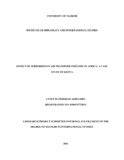| dc.description.abstract | In spite of advances in security screening innovation and the arrangement of noteworthy human and budgetary assets throughout the years, the common aeronautics division still stays powerless against terrorist assaults. This study tried to evaluate the effect of terrorism on air transport industry in Africa, a case study of Kenya. The specific objectives of the study were to establish the role of air transport industry in Africa, to evaluate the impacts of Terrorism on air transport industry in Kenya, and to determine and analyze the mitigation strategies adopted by the government to deal with terror in the air transport industry. The study utilized rational theory of international relations. The theory assumes that terrorist demonstrations typically exude from reasonable, ascertained, cognizant choices. These choices speak to an ideal procedure to satisfy the sociopolitical objectives of these culprits. At the end of the day, as indicated by this hypothesis, terrorism won't not speak to neurotic or counter-intuitive conduct but rather, could, speak to the best intends to satisfy individual needs in a few conditions. The study found that the measures that have been set up to counter terrorism in air transport; worry and indictment or removal of culprits of terrorist acts, as per the significant arrangements of national and universal law, escalating participation, as suitable, in trading convenient and exact data concerning the aversion and battling of terrorism, reinforced coordination and collaboration among states in fighting violations that may be associated with terrorism, incorporating drug trafficking in every one of its angles, unlawful arms exchange, specifically of little arms and light weapons. The study found the difficulties to counterterrorism to incorporate question in sharing knowledge on touchy data which opens different accomplices to a specific level of powerlessness, absence of shared insight reports. One of the respondents included "absence of very much prepared hostile to terrorism drive and offices, diverse counter terrorism needs and distinctive legitimate frameworks are additionally challenges confronted by counter terrorism association. The discoveries found that absence of HR, universal/national laws, contrasts involved with states from which radicals rise, lawful and arrangement issues with data sharing, contrasts in way to deal with counterterrorism operations, observing and surveying progress, innovative and operational contrasts (i.e., contradiction in: frameworks to share data), social contrasts/absence of trust, and responsibility. The study presumed that worldwide associations framed to counter terrorism in air transport industry are US-African joint security operation, IGAD, NATO, Trans-Saharan counterterrorism Initiative organization (TSCTI) and AMISOM. As indicated by one of the respondent "NATO's work on counter-terrorism concentrates on enhancing attention to the risk, creating capacities to plan and react, and upgrading engagement with accomplice nations and other universal performing artists." International on-screen characters, for example, the UN, the EU, the US and provincial on-screen characters, for example, the AU and Intergovernmental Authority on Development have similar points of interest in contributing towards counter-terrorism in EA. The study prescribed that The Kenyan government needs to put more endeavors in the general work of the instruments of energy to enhance the measures in battling the transnational terrorism risk in the nation. To diminish the dangers for future terrorist assaults, the administration needs to genuinely address the components of the risk calculates request to hinder any future assaults. In the battle against terrorism in Kenya, subjective change is what is required rather than quantitative. The legislature ought to along these lines indicate political will by ordering antiterrorist enactment and concentrate on apportioning sufficient assets to the accompanying instruments of energy to moderate the risk: data; law implementation and knowledge; and financial improvement. | en_US |

